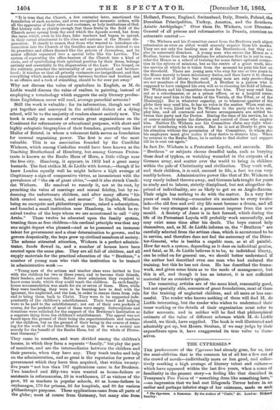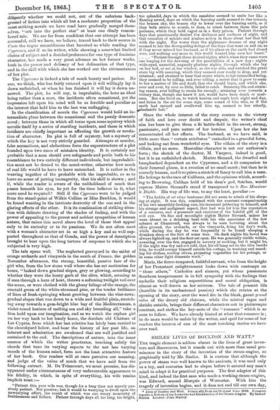THE CYPRESSES.*
THE predecessors of the Cypresses had already gone, for us, into the semi-oblivion that is the common lot of all but a few out of the crowd of novels—individually more or less good, and collec- tively marking a high average of literary talent and culture— which have appeared within the last five years, when a sense of familiarity in the present story—a feeling like that described in Tennyson's Two Voices of "something done like something here," —an impression that we had met Ildegonda Trevor before in an earlier and perhaps inferior stage of her existence, made us seek * 2eCypresses. A Romanoe. By the Author of 'Caste," &c. London Richard Bentley.
diligently whether we could not, out of the nebulous back- ground of fiction into which all but a moderate proportion of the most striking novels we have read have gradually merged them- selves, "orb into the perfect star" at least one dimly remem- bered tale. We are far from confident that our attempt has been successful, still we have, we believe, traced back to their source in Caste the vague resemblances that haunted us while reading the Cypresses, and if so its writer, while showing a somewhat limited choice of subject and a decided preference for one type of feminine character, has made a very great advance on her former works, both in the power and delicacy of her delineation of that type, and in the skill with which she has worked out the circumstances of her plot.
The Cypresses is indeed a tale of much beauty and pathos. No one, we think, who has fairly entered upon it will willingly lay it down unfinished, or when he has finished it will lay it down un- moved. The plot, he will say, is improbable, the hero an ideal being rather than a man, the incidents often sensational, yet the impression left upon his mind will be as forcible and peculiar as the interest that held him to the last was unflagging.
In the classification of novels the Cypresses would hold an in- termediate place between the sensational and the purely domestic novel ; between those in which all turns upon some mystery which unveils itself by a series of startling incidents, and those in which incidents are chiefly important as affecting the growth or revela- tion of character. Its plot is full of mystery, but a mystery of which the key is not very strictly guarded. Attempts at murder, false accusations, and abductions form the superstructure of a plot founded upon two cases of mistaken identity. It is certainly not probable that a man should owe safeguards and perils both to his resemblance to two entirely different individuals, but improbabili- ties must not be denied to the novel-writer, otherwise how much of real life would he have to leave untouched. It is rather in the weaving together of the probable with the improbable, so as to • leave no sense of jarring incongruity, that his skill is shown ; and if, while the reader is aware of the unlikelihood of much that passes beneath his eyes, he yet for the time believes in it, what more need be required? Still if the Cypresses were to be judged from the stand-point of Wilkie Collins or Miss Braddon, it would be found wanting in the intricate dexterity of the one and in the glaring effects of the other. It is its combination of striking situa- tion with delicate drawing of the shades of feeling, and with the power of appealing to the purest and noblest sympathies of human nature, that raises this novel above the level of those that appeal only to its curiosity or to its passions. We do not often meet with a woman's character set in so high a key and so well sup- ported throughout as that of Gonda, and the power of description brought to bear upon the long torture of suspense to which she is subjected is very high.
The tale opens well. The neglected graveyard in the midst of orange orchards and vineyards in the south of France, the golden November afternoon, the strong, beautiful, passive face of the girl who, from the low stone wall where she has sat motionless for hours, "looked down gradual slopes, grey or glowing, according to whether they wore the hoary garb of the olive, which, seeming as if seen through a haze of heat, throws a softening twilight veil over the scene, or were clothed with the glossy foliage of the orange, the emerald green of the white-stemmed pine, or the tender brilliance of lines of fresh-springing wheat growing between the vine-rows; gradual slopes that run down to a wide and fruitful plain, stretch- ing away towards a gem-bright blue bay of the Mediterranean, a violet-toned horizon of melting sea and sky bounding all," take a firm hold upon our imagination, and as we watch the orphan girl on her way back to her lonely home, the desolate old Chateau of Les Cypres, from which her last relative has lately been carried to the churchyard below, and hear the history of her past life, an interest and admiration are awakened that are well justified and sustained to the end. The descriptions of nature, into the inner essence of which the writer penetrates, touching subtly the chords that tune its varying aspects to the not less varying moods of the human mind, form not the least attractive feature of her book. Our readers will at once perceive our meaning, and judge of the value of much that we have said from the following extract. M. De Triancourt, we must premise, has dis- appeared under circumstances of very unfavourable appearance to his fidelity, in which, in spite of everything, his wife retains implicit trust:—
. "Patient this poor wife was, though for a long time not merely pas- sively patient Not passive ; but it would be wearying to dwell upon the uni.vearying effort, the result of which was one weary monotony of friutleasness and failure. Patient through days all too long, too bright,
too splendid, days in which the sunshine seemed to smite her like a flaming sword, days on which the burning earth seemed to rise towards the brazen sky, the brazen sky to lower over the burning earth, as if they both strove to scorch, to daze, to crush between them this pale patience, which they held caged as in a fiery prison. Patient through days that passionately desired the darkness and coolness of night, and that cessation of minute and aimless action in those about her that fell with the night. Far worse than the nightmare dreams of any night
seemed to her the disregarding doings of the days that went on and on, as if they never missed her husband, as if his place on the earth had closed over, and nothing any more in this world wanted him save her heart." . . . . "Patient through those desired nights, which when they came were one longing for the dawning of the possibilities of a new day ; nights wide-eyed, unrestful, augustly glorious nights, through which she lay on her bed, or sat at her window, as she was able, and watched the great stars big with meaning, which they seemed over ready to drop, and yet retained; and strained to hear that secret which, to her intensified being, they seemed to be telling, and ever telling, a secret that it grew to seem to her a matter of life and death that she should learn, and which she, over and ever, by over so little, failed to catch. Straining life and strain- ing reason, ever failing to strain far enough ; straining over towards a victory that, though she knew it not, would have been death or mad- ness. But she lived on, to watch heaven and earth both night and day, and listen in the air for some sign, some sound of him who, as if the earth had opened and swallowed him up, seemed to her utterly, bsolutelv lost" Since the whole interest of the story centres in the victory of faith and love over doubt and despair, the writer's chief aim has been to give them a fit battle-field in the sweet, strong, passionate, and pure nature of her heroine. Upon her she has concentrated all her efforts. The husband, as we have said, is little more than "certain attributes" embodied in a graceful form, and looking out from wonderful eyes. The villain of the story is a villain, and no more. Masculine character is not our authoress's forte ; the sketch of the doctor, M. Vauprez, indeed is good, but it is an unfinished sketch. Maitre Siccand, the dwarfed and humpbacked dependent on the Cypresses, and a fit companion to their funereal gloom, is a creation of no small merit ; but then he is scarcely human, andit requires a stretch of fancy to call him a man. He belongs to the race of Calibans, and the opinions which, accord- ing to Browning, Caliban held of his dam's god, Setebos, would express Maitre Siccand's creed if transposed to le Bon Monsieur le Diable. His way of life was, to say the least, peculiar :— " The habits of cet vie= bonhonvne did not seem to admit of his sleep- ing at night. It was this, combined with the constant companionship of his two unearthly-looking cats, his incessant jabbering to himself, and his strange and malignant aspect, that had won for him the reputation of a sorcerer, and a possessor and exerciser of the baleful gift of the evil eyo. On fine and moonlight nights Maitre Siceand, unless he were absent on a drinking bout with his vile associates of the low cabaret at Chtuitreuil, was always to be seen hovering about the olive ground, the orchards, or the vineyards, doing his day's work, while during the day he was frequently to be found sleeping a drunken sleep at the foot of some tree. On dark nights his hovel was always lighted up, and the door set open. He was generally visible within, cowering over the fire, engaged in sorcery or cooking, but it might be, if the night was dry and not cold, that his oil lamp set on the tiles beside him, he would occupy himself outside his cottage, in washing and mend- ing his clothes, sorting olives, preparing vegetables for his pottage, or in some other light domestic work."
Marie, the fierce-tempered, faithful servant, who from the height of her Protestant enlightenment looks down with contempt on "those others," Catholics and sinners, yet whose passionate Southern temperament is in full sympathy with the feelings that underlie their religious superstitions and moral obliquities, is almost as well drawn as her mistress. The tale of peasant life (horrible in its unchastened passion) which she relates at the opening of the story, over the wood fire in the bleak, gaunt grand salon of the dreary old chateau, while the mistral rages and shrieks outside, brings their different characters out in picturesque contrast, and strikes the key-note of the " romance " which is so soon to follow. We have already hinted at what that romance is ; to do more would be unfair by the writer, and spoil for some of her readers the interest of one of the most touching stories we have ever read.



































 Previous page
Previous page